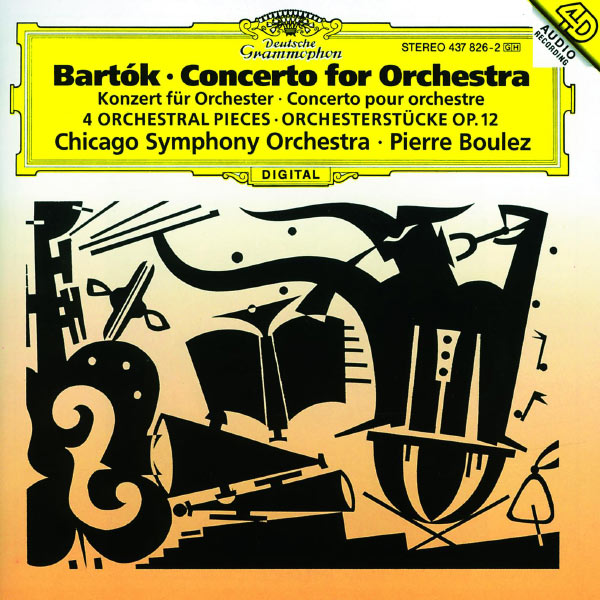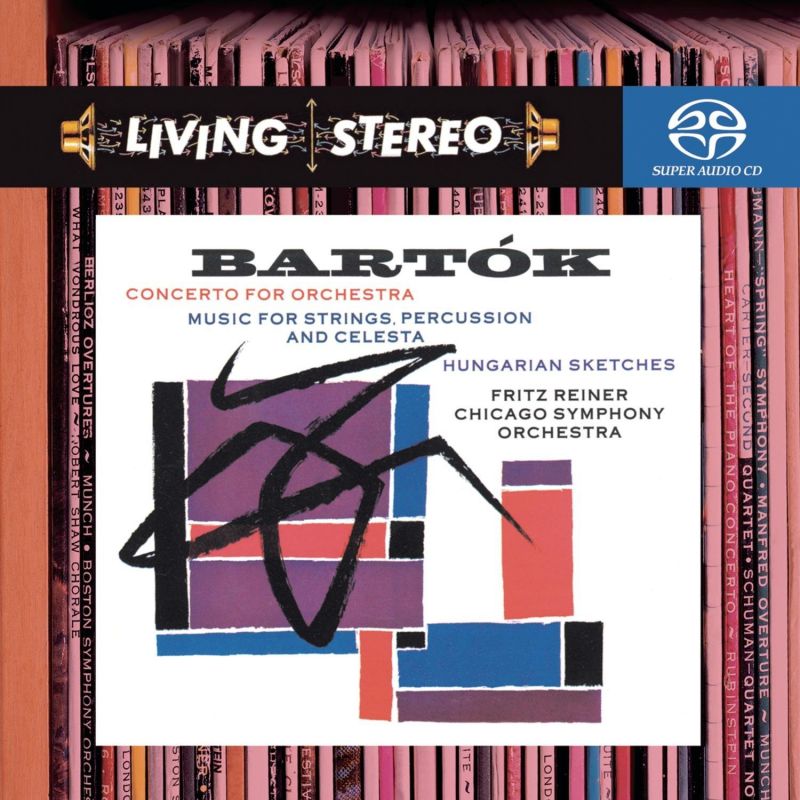Bartók Orchestral Works
View record and artist detailsRecord and Artist Details
Composer or Director: Béla Bartók
Genre:
Orchestral
Label: DG
Magazine Review Date: 3/1994
Media Format: CD or Download
Media Runtime: 60
Mastering:
DDD
Catalogue Number: 437 826-2GH

Tracks:
| Composition | Artist Credit |
|---|---|
| Concerto for Orchestra |
Béla Bartók, Composer
Béla Bartók, Composer Chicago Symphony Orchestra Pierre Boulez, Conductor |
| (4) Pieces |
Béla Bartók, Composer
Béla Bartók, Composer Chicago Symphony Orchestra Pierre Boulez, Conductor |
Composer or Director: Béla Bartók
Label: Decca
Magazine Review Date: 3/1994
Media Format: CD or Download
Media Runtime: 68
Mastering:
DDD
Catalogue Number: 436 210-2DH

Tracks:
| Composition | Artist Credit |
|---|---|
| (2) Portraits |
Béla Bartók, Composer
Béla Bartók, Composer Charles Dutoit, Conductor Montreal Symphony Orchestra |
| Divertimento |
Béla Bartók, Composer
Béla Bartók, Composer Charles Dutoit, Conductor Montreal Symphony Orchestra |
Composer or Director: Béla Bartók
Genre:
Orchestral
Label: RCA
Magazine Review Date: 3/94
Media Format: CD or Download
Media Runtime: 76
Mastering:
ADD
Catalogue Number: 09026 61504-2

Tracks:
| Composition | Artist Credit |
|---|---|
| Concerto for Orchestra |
Béla Bartók, Composer
Béla Bartók, Composer Chicago Symphony Orchestra Fritz Reiner, Conductor |
| Music for Strings, Percussion and Celesta |
Béla Bartók, Composer
Béla Bartók, Composer Chicago Symphony Orchestra Fritz Reiner, Conductor |
| Hungarian Sketches |
Béla Bartók, Composer
Béla Bartók, Composer Chicago Symphony Orchestra Fritz Reiner, Conductor |
Composer or Director: Béla Bartók
Genre:
Orchestral
Label: Living Stereo
Magazine Review Date: 3/1994
Media Format: CD or Download
Media Runtime: 76
Mastering:
Stereo
ADD
Catalogue Number: 09026 61504-2

Tracks:
| Composition | Artist Credit |
|---|---|
| Concerto for Orchestra |
Béla Bartók, Composer
Béla Bartók, Composer Chicago Symphony Orchestra Fritz Reiner, Conductor |
| Music for Strings, Percussion and Celesta |
Béla Bartók, Composer
Béla Bartók, Composer Chicago Symphony Orchestra Fritz Reiner, Conductor |
| Hungarian Sketches |
Béla Bartók, Composer
Béla Bartók, Composer Chicago Symphony Orchestra Fritz Reiner, Conductor |
Author:
Boulez unleashes these mammoth effusions without taming them: his orchestra confronts Bartok's searing climaxes head-on, and DG's engineers brook no compromise. Comparing this performance with Boulez's earlier New York version on Sony—another fine reading—reveals a 1'14'' speed increase in the ''Preludio'' (6'32'', as opposed to 7'46'' two decades earlier), though the other three pieces are now rather broader than they were. Also, the newer recording has clearer definition and a far wider dynamic range. Having emerged in the wake of Sz51's closing pages, the sombre opening of the Concerto for Orchestra sounds uncommonly menacing. Yet in the event, Boulez delivers a relatively conservative interpretation; it is a good, clear-headed reading, generally well played but not quite as involving as the conductor's New York version from 1972 (Sony, 11/87—nla). The first movement is nicely animated, although there's a fair amount of extraneous noise at around 8'30''—including what sounds like a distant car horn. The ''Pair Play'' second movement is pleasantly relaxed, the ''Elegia'' and ''Intermezzo Interrotto'' keenly characterized. But the finale occasionally seems faster than the Chicago violins can manage comfortably, although the closing moments burst upon us with immense impact, crowning a fairly positive contender in a very healthy field.
If you really want to test the mettle of Boulez's strongest rivals, then Reiner's CD is a good place to start. Both recordings were made in Chicago's Orchestra Hall: Boulez's at the end of 1992, Reiner's in October 1955 (not that spot-check sampling would reveal the age difference—quite the contrary). RCA's sound reportage of the score's quieter moments has uncanny realism and if the climaxes are occasionally reined in, the sheer fervour of Reiner's direction more than compensates. The ''Pair Play'' is a very brisk 6'26'', the finale taut and agile: compare the movement's opening in both versions and Reiner's greater precision and control is immediately apparent. The couplings, too, are excellent: a
So, after clear-thinking Boulez and hard-driving Reiner, Charles Dutoit has Bartok parade as a master colourist. This last option works particularly well in the second of the two Portraits—the 'Grotesque' distortion of the 'Ideal' that was so serenely etched in the First—and the Divertimento, with its constantly shifting perspectives between a full string band and a concertante quintet. In both works, Dutoit's rhythmic suppleness, wit and feeling for nuance pay substantial dividends, especially during the final few minutes of the Divertimento, where Bartok apes all manner of musical styles. But The Miraculous Mandarin is hectic and dizzy, a tonal salad tossed so that the brightest ingredients can rise to the top. It is almost like a caricature, the main protagonists set as comic figures: fast-moving, cartoon-like and oddly cavalier in their musical gestures. Even the more tender closing sequences seem glossed over, and there's one passage—3'17'' into track 2 (''First decoy game'')—where ff second and third trumpets are either absent or extremely shy. The engineers, however, have done a spectacularly good job in capturing the full range of Dutoit's kaleidoscopic interpretation. I might not like it, but it certainly does make an exciting noise!
As to recommendations: Reiner's Concerto and
Discover the world's largest classical music catalogue with Presto Music.

Gramophone Digital Club
- Digital Edition
- Digital Archive
- Reviews Database
- Full website access
From £8.75 / month
Subscribe
Gramophone Full Club
- Print Edition
- Digital Edition
- Digital Archive
- Reviews Database
- Full website access
From £11.00 / month
Subscribe
If you are a library, university or other organisation that would be interested in an institutional subscription to Gramophone please click here for further information.





